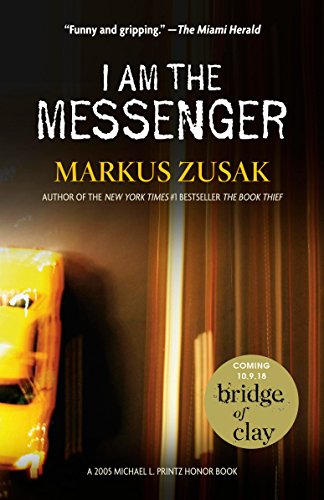Book Review: I Am the Messenger by Markus Zusak


On some level, it must suck to create a work of great innovation or genius. Though you’re forever lauded for and associated with that work, everything else you do is also compared to it in perpetuity, and generally found lacking. Such is the case for Markus Zusak, Australian YA writer, whose 2005 novel The Book Thief rightfully won a slew of literary awards, was one of the books that sparked adult interest in novels ostensibly aimed at teens, and was even got the de-rigeuer forgettable Hollywood treatment in 2015. It’s no wonder it took Zusak until 2018 to follow up that act with the newly released Bridge of Clay. But since the new novel wasn’t out yet when I loaded up on Kindle books in the fall, I went back a bit to Zusak’s I Am the Messenger, published three years before The Book Thief.
I Am the Messenger follows Ed, an unremarkable, no-ambition, 19-year-old Lost Boy and cab driver who stumbles onto—and accidentally thwarts—a bank robbery. The local media hails him as a hero. Shortly after, Ed begins receiving playing cards scrawled with names, addresses, or other vague clues, in the mail. As he begins to investigate the clues, he discovers a diverse group of people who need help in one form or another, from the serious (domestic abuse) to the moment-of-joy (a single mother who really just wants to enjoy her own ice cream cone).
Despite his propensity for hanging out with a bunch of fellow do-nothing cabbies, getting drunk, and sleeping till afternoon, Ed begins to find purpose in helping others. His relationship with 15-year-old high school runner Sophie sometimes borders on the creepy—he fairly stalks her as he investigates her case, and repeatedly thinks or remarks about her long legs and pretty face (probably true to life for a 19 year old, but she is, after all, underage). But he develops a touching relationship with Milla, a senile elderly woman who is still waiting for her 60-years-dead husband, Jimmy, to come home from the war, and a cheerful family who struggle to pay the bills but whose love for each other is evident.
If this all sounds a bit sedate, there’s plenty of action in I Am the Messenger, as well. Beyond the bank robbery scenes, Ed takes on a rapist and a pair of brothers who can’t seem to stop fistfighting; the kidnapping of his coffee-slurping dog, the Doorman; and even gets the stuffing beat out of him by some shadowy associates of the card sender. But it’s the relationships—between the Ed’s cases and himself, or between the people who populate the cases—that take center stage in this story.
Also taking a spot, perhaps slightly to the right of center stage, is romance. Ed’s been carrying a torch for one of his best friends, Audrey, as long as he’s known her, and has always believed she didn’t return his feelings. But that doesn’t stop him from thinking about her in most of his free moments, and even some not-so-free ones.
Ed’s longing for Audrey and the problems of the people he helps are wisely designed by the author to highlight his main character’s finest trait: his empathy. Even though Ed talks a good game about not caring about much of anything, he, perhaps reluctantly in the beginning, forges deep connections with people in need. This becomes even more overt as Ed helps Audrey and his other best pals, Ritchie and Marv, with issues in their own lives, or when the lens is turned on Ed’s life and his tense relationship with his mother. By the end, when Ed comes face-to-face with the playing-card sender, who may or may not bear some relation to the author himself, he’s a full-on, card-carrying member of the Do Gooders Club.
I Am the Messenger is a good book—for the most part, the main characters are well-drawn and delineated; the fail here is Audrey, the sort of no-maintenance yet stunning, I-can-hang-with-the-dudes Cool Girl who seems to exist solely in books, movies, and TV shows written by men. The plot moves along briskly, with nicely planned detours along the way to delve into the stories of Ed’s “cases,” and an overarching theme about the power of kindness, no matter how simple. And the writing is full of the dark humor and clever observations Zusak has become famous for. But Messenger doesn’t reach the artistic heights of The Book Thief, which brilliantly, sometimes hilariously and sometimes poignantly, juggled some major themes about humanity. It’s still worth reading, but if you haven’t yet read The Book Thief, do yourself a favor and read Messenger first.
Miss the previous book review? Read it here.